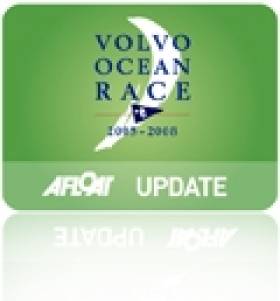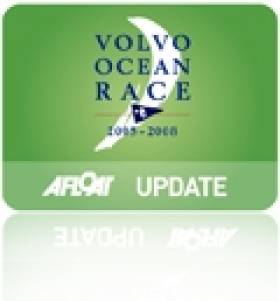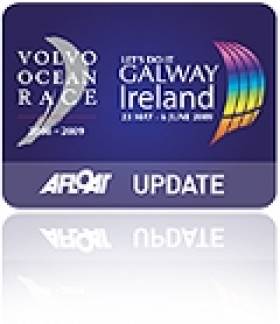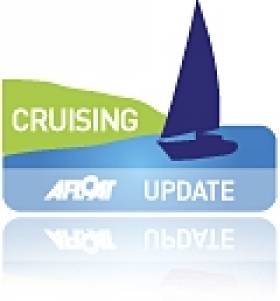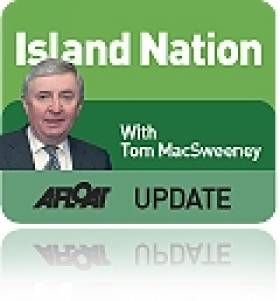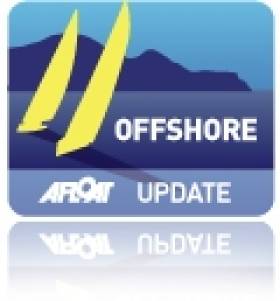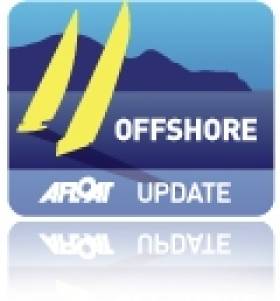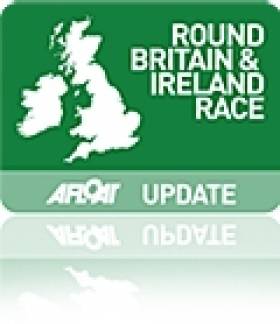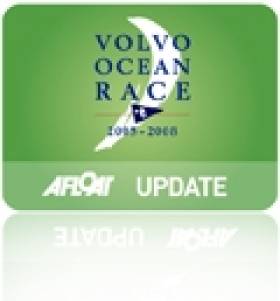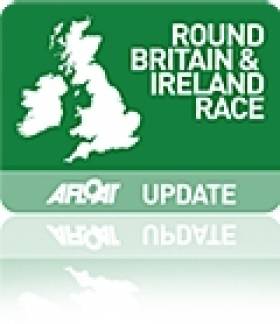Displaying items by tag: groupama
#VOLVO OCEAN RACE - Damian Foxall hopes it will be fourth time lucky in his quest to clinch a Volvo Ocean Race victory - but as he tells the official VOR website, he won't be resting on his laurels.
Despite the overall 23-point advantage held by his team Groupama - following a dramatic comeback victory in the most recent leg of the race - Foxall says victory is not yet assured in a field that has been growing increasingly competitive in recent weeks.
"Now we have to keep pushing," says the 42-year-old Kerryman. "“We have a very fast boat if not the fastest boat in the fleet, and we've learned how to sail it very well. There is no reason we can't win this race. We've believed that from the start and now everyone else believes it."
But the watch captain and his crew are acutely aware that it can all be lost in the blink of an eye.
"A technical hitch or a couple of poor starts like we have had recently from Lisbon and it all goes down the drain," he says. "We can't let that happen.”
This Sunday the fleet departs on the final leg of the race, a 550-mile sprint from Lorient in France to Galway through the often turbulent Celtic Sea that has the potential to scupper even the best prepared team's plans.
The official Volvo Ocean Race website has more on the story HERE.
Groupama Try Out a New Watch System
#VOLVO OCEAN RACE - Has the Groupama sailing team adopted a new simplified watch system, keeping just one man on deck to handle the vessel - as demonstrated by Ireland's Damian Foxall in the video above?
Don't worry - it's just a prank for April Fool's Day yesterday!
The yacht and its full compliment of crew have rounded Cape Horn and are currently in overall second place as the Volvo Ocean Race fleet heads to Itajaí in Brazil on the fifth leg and longest passage of the race.
Groupama and PUMA are currently battling for first place on the leg, with Telefónica hot on their heels after making up 180 miles in just 36 hours with speeds near double those of the frontrunners.
VOR Skipper Cammas Receives French Sporting Honour
Volvo Ocean Race skipper Franck Cammas has been presented with one of France’s most prestigious sporting honours.
The man in charge of the Groupama sailing team was awarded the Grand Prix de l’Académie des Sports in Paris recently, recognising his achievements in sailing in 2010.
These included his skippering of the 100ft trimaran Groupama 3 non-stop around the world in a record-breaking in 48 days, 7 hours, 44 minutes and 52 seconds.
Cammas is only the fifth sailor to be presented with the award, following Whitbread Round the World Race skipper Eric Tabarly, 1983 America’s Cup winner John Bertrand, solo sailor Isabelle Autissier and Alinghi team principal Ernesto Bertarelli.
But Cammas isn't resting on his laurels, as he's currently preparing with his team to compete in the next Volvo Ocean Race kicking off next month.
He will lead a crew of 11 sailors - including Kerryman Damian Foxall - on the 70ft monohull Volvo Open 70 Groupama 4 in the 39,000 nautical mile race, which is set to conclude in Galway next summer and will also involve Wexford sailor Justin Slattery, who is in the crew for Team Abu Dhabi.
The action starts in Alicante, Spain on 29 October with the first in-port race. The first leg to Cape Town then begins on 5 November.
Irish Cruising Club Present Fastnet Award to Killian Bushe
So whenever a high-powered strongly-resourced international challenge is taking shape, Bushe is the boat-builder of choice, favoured by leading designers and top skippers alike. But if you have a challenge in mind and he is top of the list, please join the queue.
For at the moment, he is immersed as leading consultant in building the new Groupama 4, the top French Volvo 70 for Franck Cammas. Before that, he built the two successful Ericsson boats for the last Volvo – they took first and fourth. In fact, he has built the overall winners of the last three Volvo races. And when Groupama 4 is launched in May and signed off for the race (which starts on October 29th) Bushe returns his focus to Sweden which is now his home, where he has been involved with the Artemis challenger for the America's Cup 2013.
For that project, the designer is Juan Kouyoumdjian, and the skipper is Paul Cayard. This is stratospheric stuff, but that's the level where Bushe operates. With more than thirty years of high tech boat building experience, and a string of success that is mind-boggling, he is the gold standard. But beyond that, he is still the Crosshaven kid who started his racing on his father George's Avocet (which George designed and built), and internationally he is the spirit of Cork sailing.
His renowned skill and knowledge in the use of advanced materials and composites is such that you'd expect him to be awarded a Honorary Doctorate in chemistry from some appropriate university. But in the meantime, his special place in Irish and world sailing was honoured on Saturday March 26th with his award of the Fastnet Trophy.
This trophy is co-ordinated by the Irish Cruising Club, and it operates in very broad brief. Initiated in 2005 with its first award to Paddy Barry and Jarlath Cunnane for their pioneering circuit of the Arctic via both the Northwest Passage and the Northeast Passage, its unique lineage has been maintained by such awardees as Robin Knox-Johnston, and the most recent one, centenarian circumnavigator Bill King of Galway.
The Fastnet Trophy is envisaged as highlighting a contribution to sailing which has a sense of the unique about it, and Killian Bushe is just the man. His international sailing achievements began back in 1976 when he was one of the crew that won the Half Ton Cup at Trieste in the Cork-built Silver Shamrock. They celebrated by sailing up the Grand Canal in Venice with spinnaker set. But gradually the boat-building took over, though Bushe sails with his family in Sweden whenever he can. That is what was being celebrated on Saturday night. Killian Bushe – very good sailor, extremely good boatbuilder.
Damian Foxall is First Choice
"When Damian is on a project, it is often the winning one. As such, it is better to have him with us rather than against us."
That tribute to Damian Foxall comes from Franck Cammas, renowned amongst the top sailors in the world. In France his sporting fame lies somewhere between rock star and iconic status. He has a record-breaking career. This year he added two world races to his achievements, the Jules Verne Trophy and the Route du Rhumm.
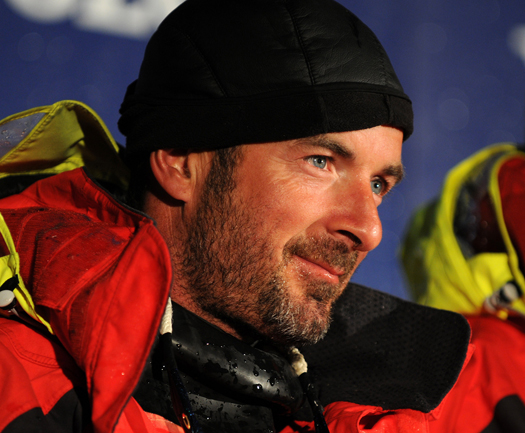
Ireland's Offshore Ace Damian Foxall has joined Groupama for the next Ocean Race
He races "anything and everything that floats" and his reputation is so strong that the huge worldwide Groupama insurance company has committed over a decade of sponsorship support to his projects. In return he has carried their name on a winning partnership with five world records amongst the list of successes. That kind of dedication from a backer is almost unheard of in any sport and has provided the financial muscle to confirm that Camas will lead the entry of boats into the Volvo Ocean Race around the world until 2015.
"Our commitment is to a race that, given its longevity on the circuit, has a human dimension and an international relevance," said Groupama Managing Director Jean Azéma. "We chose the Volvo to promote our image and share the benefit with Franck Cammas who is a sporting icon. Both of us, through the boat named Groupama, are interested in the values of building a boat, a sport and a reputation, with human interest. This is something that will last."
That huge commitment contrasts with the on-going financial struggle to enter an Irish boat. Damian, who crewed the last Irish entry, the Green Dragon, is no longer available, having been given a huge endorsement and tribute by Cammas who chose him first as an essential part of the Groupama entry.
He named the Kerryman, from Derrynane, as the first sailor he wanted aboard. Foxall, at the age of 41, is arguably the most French of Irishmen. Now resident in Lorient, he has taken part in three Volvo Ocean Races and won the last Barcelona two-crew non/stop round-the-world race with Jean-Pierre Dick.
He has been appointed to three responsibilities, as Helmsman, Trimmer and Crew Manager and is enthusiastic about going around the world for a sixth time, having also been part of a non/stop world speed record:
"I have been involved with Franck since the outset of this entry. The greatest challenge is to drive Groupama 4 at one hundred per cent of her potential at each of the nine stages of the race, with very little time during the stopovers. In a nine-month race fatigue accumulates. At the end, you really feel that you've done a circumnavigation of the globe."
Damian has worked alongside Cammas to select the sailing crew for next year's race. They include top international sailing names: Philip Harmer, Magnus Woxén, Jean-Luc Nélias, Charles Caudrelier, Sébastien Josse, Yann Riou, Jacques Caraës, Martin Krite, Brad Marsh, Martin Strömberg, Erwan Israël and Sébastien Marsset.
The Groupama project bought the winning boat in the last Volvo Race, the Volvo 70, Ericsson 4, which they rechristened, Groupama 70 and which they have been using for training. That shows their financial resources.
For the design of Groupama 4, their new boat for the 2011 event which will start next October, they turned to Juan Koujoumdjian, who was involved in building the last two winning Volvo boats, Ericsson 4 and ABN Amro One. The design is being tested in sailing trials off Lorient in Brittany where the team is based and which is Foxall's home base.
Cammas has put together a strong Groupama Sailing Team, with Foxall's input. Another Green Dragon sailor has been chosen as Pitman, Master Sailmaker and to back-up Damian as Helmsman and Trimmer. He is Australian Phil Harmer for whom this will be his third Volvo: "I feel really lucky to be in the Groupama Team. I sailed with Damian on Green Dragon and he called me to ask me to join. Since then I've had other offers, but I don't want to leave Groupama. There's a strong sense of involvement and no other team is in a position to do better."
This article is reprinted by permission of the EVENING ECHO newspaper, Cork, where Tom MacSweeney writes maritime columns twice weekly. Evening Echo website: www.eecho.ie
Foxall to be Groupama Helmsman, Trimmer and Crew Manager
The Daily Sail website is reporting Foxall will take up the position of helmsman, trimmer and crew manager. More HERE.
Foxall Podcast from Volvo Ocean Race
Groupama Sets Pace Round Britain and Ireland
Almost exactly two days into the Sevenstar Round Britain and Ireland Race, Franck Cammas' Volvo Open 70, Groupama, was the first yacht to round Muckle Flugga at 1400 BST. They are now heading southwest at a speed of over 17 knots with their 19-mile lead rapidly increasing over their rivals Telefonica Azul, who are still beating up to Muckle Flugga reports Louay Habib.
Jonny Malbon's IMOCA 60, Artemis Ocean Racing, has 77 miles to go to reach the top of the course and will round the remote island alone, as they have been for much of this race. On board is Olympic 49er medallist, Simon Hiscocks who is very much at home racing a 49er or an extreme 40, but offshore racing is a very new concept to him. (See Simon's video blog http://sevenstar.rorc.org/newsblogsphotos.html
Artemis Ocean Racing is going well and 48 hours into the race they are second overall under IRC behind Piet Vroon's Ker 46, Tonnerre de Breskens. Early leaders on handicap, the British Keelboat Academy's TP52, John Merricks II, are now third overall but sailing further offshore and look to be getting into more breeze.
Meanwhile the young crew on Tony Lawson's Class 40, Concise are feeling the effects of this brutal race. "We are cold, wet and busting a gut to keep up with the bigger boats in front of us." Said Tom Gall, skipper of Concise. "The boat has been like a submarine since we left Cowes and we are living off tea and porridge. Tom Dawson comes from Newcastle, and when we passed his home town, he told us how good the fish and chips are. I must say I was licking my lips when I told him to belt-up. This is a tough, tough race but when I look at the crew around me, I just well up with pride for what we are doing."
In IRC Two, Adrian Lower's Swan 44, Selene, is top of the class and has opened up a nine-mile lead on Harry Heijst's S&S 41, Winsome. This may be down to their secret weapon, Tabasco: "We have more bottles of the pepper sauce on board than we have crew," admitted Adrian. "It helps spice up the bland food and warms up the lads as we go north. We are taking part in this race, partly for the challenge of sailing round our Island non-stop, but also to show that an old boat can be competitive."
Driving rain is sweeping across the racecourse but the good news is that the severe weather predicted for Thursday may well be further south than expected. Lighter conditions may well prevail tonight, but one thing that is certain about the Sevenstar Round Britain and Ireland Race; nothing can be taken for granted.
ENDS/...
The Sevenstar Round Britain and Ireland Race is being tracked with OCTrackers. Each boat is supplied with an OCTracker beacon, a self contained unit that transmits the position of the boat at regular intervals using GPS. You can watch the race as it unfolds by visiting: http://sevenstar.rorc.org/tracking.html
22,000 people are also playing the virtual race game. It's not too late to join the race. Sign up via the website: (http://sevenstar.rorc.org/).
Groupama in Lifeboat Fundraiser Race
The Groupama Volvo 70, with watch leader Damian Foxall, will be racing in aid of the French lifeboat service this weeken in a race created and organised since 2005 by French sailor Damien Grimont. The SNSM (Originally the Saint Nazaire St Malo) aims to promote safety at sea and support the volunteers, who rally together their members on a daily basis to offer assistance or emergency help to sailors.
Originally the SNSM record ran between Saint Nazaire and the pirate city of Saint Malo, but the route has since changed. This Sunday sailors will be required to race between Saint Nazaire and the pretty port of Sainte Marine, situated at the mouth of the Odet river.
Open to all types of boats measuring in excess of 6.50 metres, the record offers three courses, each of which relate to the speed of the participants and range between 180 and 360 miles.The largest boat at the start, Groupama 70 will have to make two return trips between Saint Nazaire and Sainte Marine, as is the case for the trimaran Gitana 11 skippered by Yann Guichard.Besides these two big names, no fewer than 56 competitors will take Sunday's start close to the port's eastern jetty between 1300 and 1400 hours local time.
Aboard Groupama 70, Franck Cammas has gathered together a large part of the crew who recently participated in the Transmanche race. Along with Jean-Luc Nélias, in charge of the navigation, we will find watch leaders Damian Foxall and Laurent Pagès, as well as Sébastien Josse, Erwan Israel, Sébastien Marsset, Yann Riou, Mike Parmenter, Philipp Harmer and Martin Krite. Another notable presence onboard comes in the form of Eurosport cameraman, Jérôme Dubarry.
Having to leave her home port of Lorient on Friday morning, Groupama 70 is expected into Saint Nazaire that same afternoon. As such the crew will, like the general public, have the opportunity to enjoy some sea rescue exercises performed by the SNSM, as well as a free concert given by the National Orchestra of the Pays de la Loire and a group called Jazz Band, who will provide an original interpretation of Tchaikovsky's "Nutcracker Suite".
"More than just a competition, the SNSM record is becoming a genuine festival of the sea for sailors on all manner of boats. Its popularity is a reflection of the responsibility we feel for supporting this organisation, which gives it all without a moment's hesitation, in what are at times difficult conditions. At Groupama we're naturally sensitive to this cause, which is why we won't solely be focusing on the sporting aspect when we take the start aboard Groupama 70. This event will also give us the chance to compare our performances with those of five participating IMOCA 60s and continue our preparation for the next Volvo Ocean Race" stated Franck Cammas, who will be joining his crew on Saturday evening, once he's had time to go out on the maxi trimaran Groupama 3, which has recently been revamped for solo sailing.
Foxall & Groupama to race Round Britain & Ireland
Damian Foxall and the Groupama crew have announced that the Shetland Round Britain and Ireland forms a major part of their Volvo Ocean Race preparation.
"We are going into the Transmanche across the channel race this month and then another race in June," said Foxall, "and then we are planning and it is all built up to the Round Britain and Ireland in September.”
Foxall has been heavily involved in selecting the Groupama team for the Volvo Ocean Race, a process that is nearly complete.
“We have more or less chosen our crew,” says Foxall. “We still have to confirm one or two slots, but we’ve started sailing with most of the guys already. By the end of September we want to have signed off the crew.”
“It was very important for us not to waste time," continues Foxall. "Even though you realise that last November the race might have seemed quite a long way away, as you get into it you realise that the race is already on. We are already coming up on deadlines with regard to the design and build of the new boat, like all the other teams are.
“So the time we spend on the water now, preparing the design and filling in the gaps with regards to what we know about the current boats and where we want to go with the new boats - it is a very important stage. So right now we are making decisions that will have basically a fundament bearing on the race results.”
This mixing of cultures has extended into the technical side of the campaign, for according to Foxall they have three sailmakers who were with other VOR teams in 2008-09. “In all areas - hether it is the sails, rig, boat, etc - most of the team has experience in working in both France and on the international circuit. That is hopefully one of our strong points.
Foxall has openly expressed disappointment with his three VOR campaigns to date, but feels that Groupama skipper Franck Cammas' involvement and enthusiasm for the project shows that the race has come of age.
"I am pretty motivated. I think the important thing from my point of view is that Franck [Cammas] and the sailing team proposed to Groupama the Volvo Ocean Race as a viable event and that shows the evolution of the VOR – especially in this edition where they believe it has got marketing and sporting value and the racing will be won on the water and not just with a chequebook.”
The full interview with Damian Foxall appears on the Volvo Ocean race homepage here



























